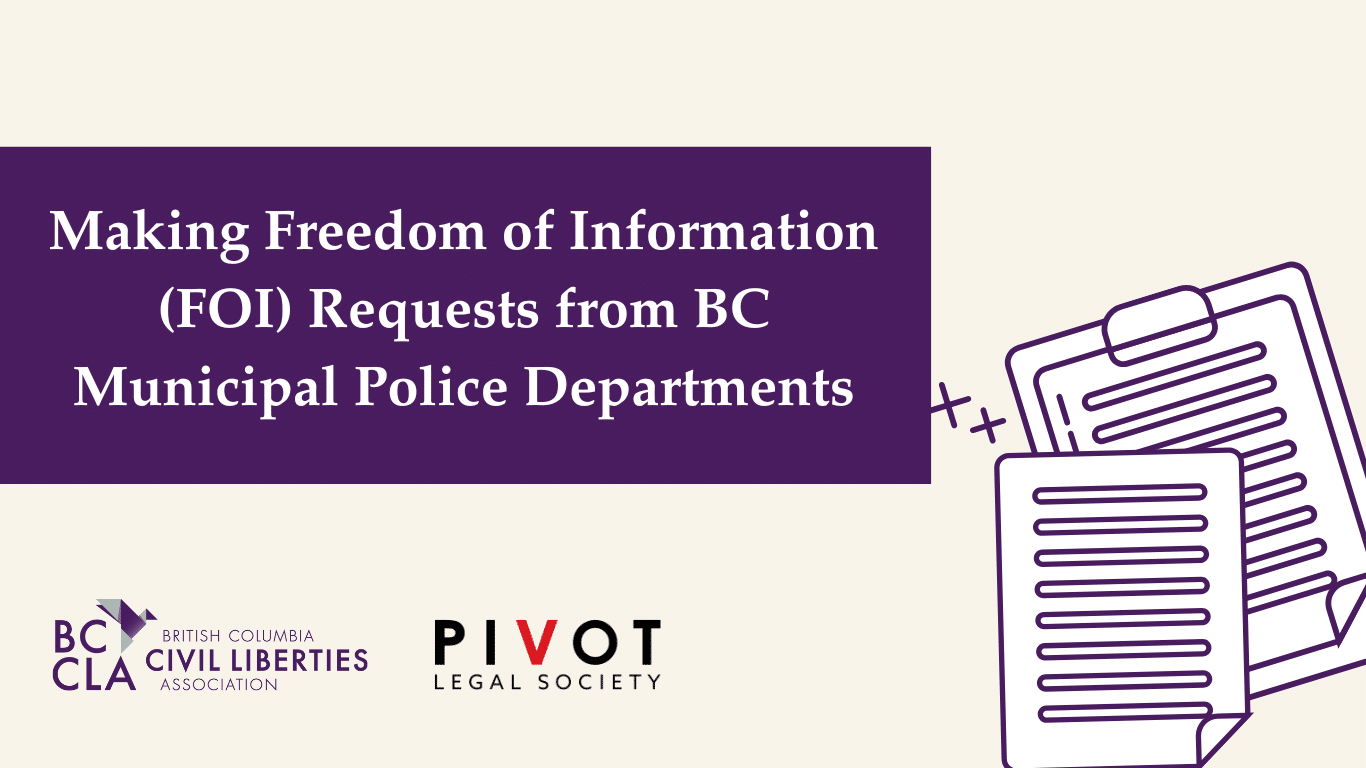
BC Municipal Police Departments and FOI Requests
In BC, municipal (city) police must obey the Freedom of Information and Protection of Privacy Act (FIPPA) and are legally required to respond to requests regarding the information they’ve recorded about you.
Yet many people don’t know how to navigate the Freedom of Information (FOI) request process – or that it’s even possible.
Pivot Legal Society and BCCLA have teamed up to develop a resources that explains how to access police information about yourself through an FOI Request.
The FOI Request Kit lays out your rights under FIPPA when requesting information from police and walks you through the steps to demand your records from municipal police forces – including police notes, bodycam footage, and information stored in the PRIME-BC database.
This resource includes:
- Step-by-step instructions on filing an FOI request with municipal police departments
- Sample wording and templates
- What to expect in response
This kit is for anyone who’s ever been stopped, questioned, surveilled, or just wants to know what information the police have recorded about them.
This project was made possible and in consultation with community members. Thank you to everyone who provided input and contributed.
Frequently Asked Questions
Do I have to pay to submit an FOI request?
You don’t have to pay to submit an FOI for information about you . You may be charged a fee for making a general FOI request or an FOI request about someone else.
Please not that requesting an FOI is different from accessing a criminal record check/police information check, which can cost money.
If I make an application for my arrest information in person, how do I get the records? Do I pick them up in person, or are they mailed out to me?
You can choose if you want to receive the records via mail or in person. Either way, you’ll be asked to provide proof of identification.
How do I know if the police department is municipal, RCMP or First Nations?
Municipal and First Nation police departments are listed on the government of BC website. If you are having difficulty finding your municipal police department, enter the following phrase into your search engine: “BC Police Forces” and then choose the BC government link (gov.bc.ca/gov/justice/policing-in-bc).
Are there any risks in filing an FOI?
Currently, there isn’t any prohibition in the FIPPA on intimidation and harassment, so, if harassment does happen, a complaint about the officer could be filed under the Police Act.
What can I do if the information in my records is not correct?
You can request corrections to be made to your information by making a request to the head of the police department. They don’t have to make the change to your records, but they do have to make a note or annotation on your files that corrections were requested.
Keep in mind that asking for corrections to the information on file for you may end up providing the police with more information on you than you’d like for them to have.
How do I file an access complaint with the office?
To find the Office of the Information and Privacy Commissioner (OIPC) guide on filing a complaint, enter the following into your search engine: “OIPC for the public” and click on the “oipc.bc.ca” link.
Does immigration status matter when I’m filing an FOI request? Is there a risk?
Your immigration status should not in any way affect your ability to request your personal records.
If you are undocumented there may be a risk involved in engaging and alerting government bodies of your presence in Canada.
When you’re asking for your information, will the police officer(s) involved find out?
No, the police officers involved are not a part of locating your information in the PRIME database.
